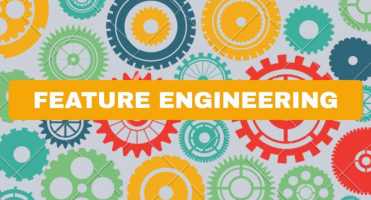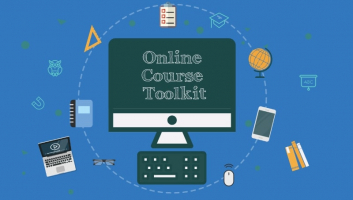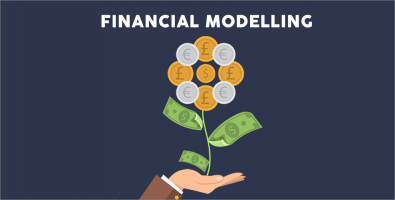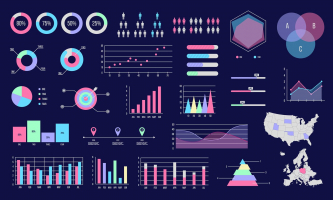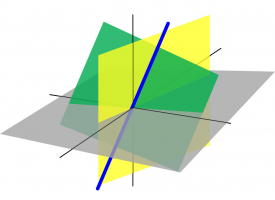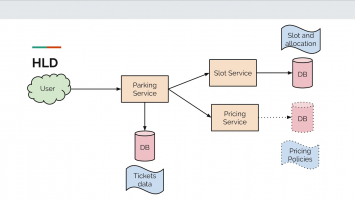Top 8 Best Online Electrical Engineering Courses
Electrical engineering is a high-demand sector with plenty of job openings for qualified workers. An online electrical engineering course is a terrific method ... read more...to build the core skills and information you need to get started if you are a student or professional interested in pursuing a career in this area. Toplist investigated and assessed the top best online electrical engineering courses to assist you in finding the best options.
-
The first online course Toplist would like to introduce to you in this list of the best online electrical engineering courses is Introduction to Electronics (Coursera). The course covers the basic ideas of electronics, such as diodes and transistors, as well as the theories that surround them, as well as their applications in science and engineering. Over 87,000 people have already joined and profited from the course. Those who want to brush up on their electronics principles can enroll in this course to review the fundamentals before moving on to more complex topics. The course is entirely online and may be completed at your own pace with flexible assignment deadlines. MOSFET circuits and their applications will be taught to students. Quizzes at the end of each module allow you to review and confirm your understanding.
Highlights
- Learn about the fundamentals of electronics.
- Understand circuit theory and how to apply it to solve problems in electronics.
- Understand how to use amplifiers and how to analyze op-amp circuits.
- Learn about diodes and how they work in circuits.
- Analyze a Bipolar Junction Transition circuit and learn about transistors.
- Robotics fundamentals and advanced concepts, as well as their mechanics
Pros: Beginner-friendly curriculum, Excellent student reviews, Flexible deadlines
Cons: Certificate costs an additional $49
Price: Free ($49 for certificate)
Time to complete: 46 hours
Prerequisites required: None
Flexible schedule: Yes
Includes verified certificate of participation: Yes
Link: https://www.coursera.org/learn/electronics
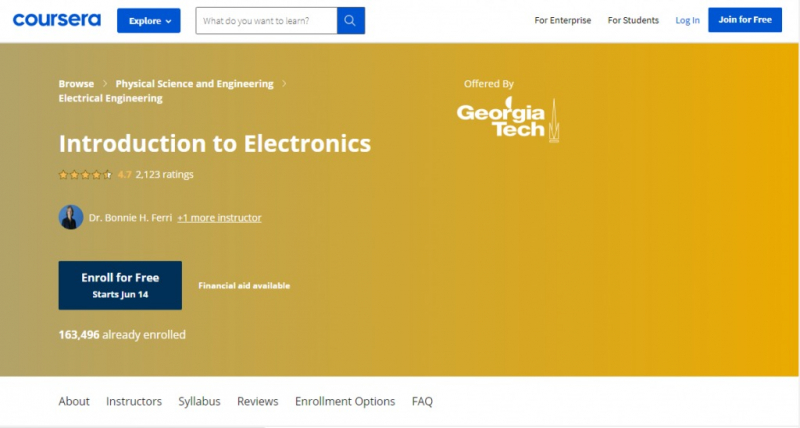
https://www.coursera.org/ 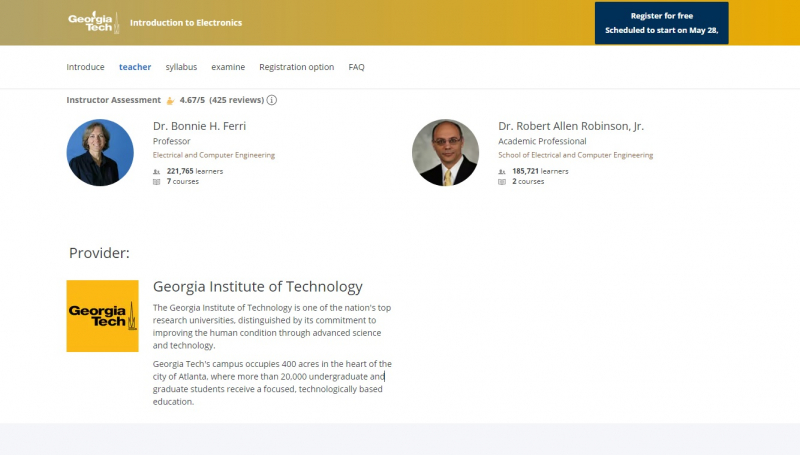
https://www.coursera.org/ -
MOS Transistors online course by Columbia University focuses on helping engineers understand how MOS transistors work and how to model them. This knowledge is critical for device modelers, circuit designers, and microelectronics engineers, making it excellent for engineering students and professionals looking to better their careers. While there are no requirements for this course, it is not ideal for beginners because it involves demanding assignments for which students will most likely need an electrical engineering background. The course is free and includes all lectures and homework, but no certificate of completion is provided. This course is best for microelectronics engineers and engineering students who need a basic understanding of MOS transistors due to the targeted subject content.
About the provider of the course, Columbia University has been a national and international leader in higher education for more than 250 years. The dedication to recruiting and engaging the brightest minds in pursuit of better human understanding, pioneering new discoveries, and service to society is at the heart of our vast range of academic investigations. Keep reading to discover more best online electrical engineering courses.
Pros: Specialized curriculum, Specialized curriculum
Cons: No certificate of completion, Not suitable for beginners
Price: Free
Time to complete: 18 hours
Prerequisites required: None
Flexible schedule: Yes
Includes verified certificate of participation: NoLink: https://www.coursera.org/learn/mosfet
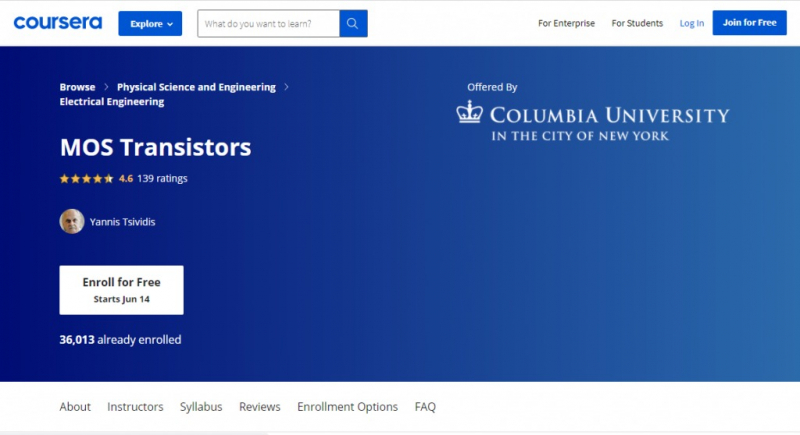
https://www.coursera.org/ 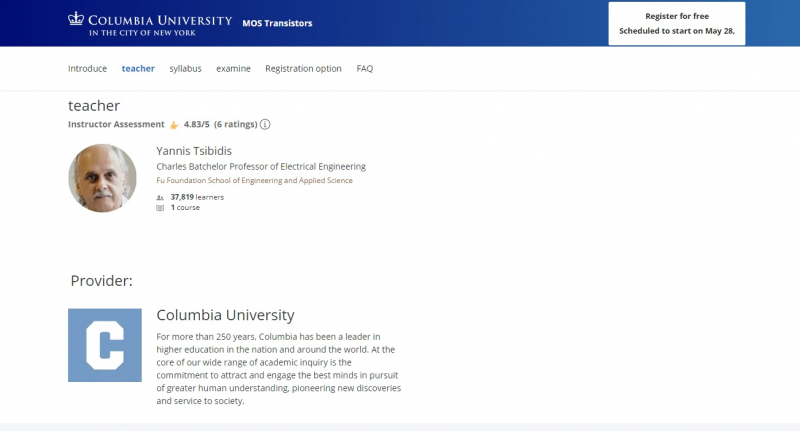
https://www.coursera.org/ -
Following the traditional second-semester undergraduate physics program, PHYS 102.1x provides as an introduction to electricity and magnetism. The electric charge in the matter, the forces between charges, the electric field, Gauss's Law, and the electric potential are all covered in Part 1. The concepts of electric current and resistance are introduced, followed by a discussion of DC circuits, which includes time-dependent behavior with resistors and capacitors. PHYS 102.1x is broken down into five weekly learning sequences, each of which includes 1.5 hours of video lectures, conceptual lecture problems, and online homework questions. During the sixth week, the course culminates with an online exam.
The course will not rigidly adhere to a textbook or assign homework based on it. Any contemporary physics textbook for freshmen would suffice. Topic-based reading assignments will be provided, along with links to various free online physics textbooks.
Pros: Taught by experienced instructors, Self-paced schedule
Cons: Not suitable for beginners, Certificate costs an additional $49
Price: Free ($49 for certificate)
Time to complete: 7 weeks
Prerequisites required: introductory mechanics
Flexible schedule: Yes
Includes verified certificate of participation: YesLink: https://www.edx.org/course/electricity-and-magnetism-part-1
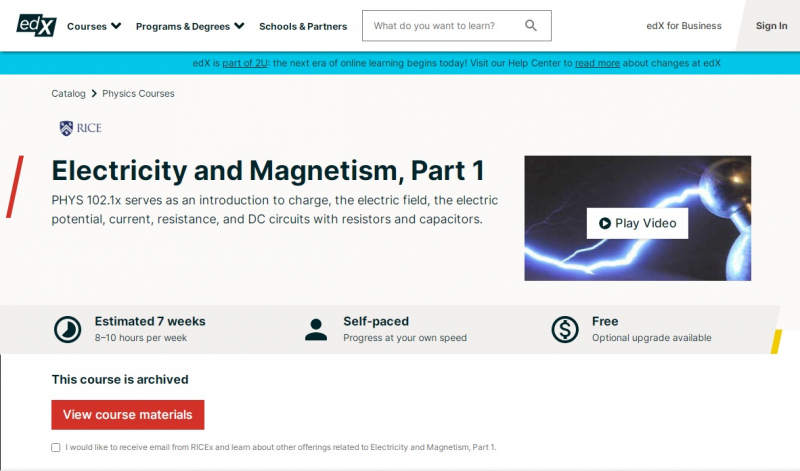
https://www.edx.org/ -
Electronics Engineering Technology Fundamentals is an excellent choice for amateurs who want to learn how to design, operate, and deal with electronics securely. This is one of the best online electrical engineering courses. To complete the course, you must have a basic understanding of algebra and trigonometry. Through a combination of lectures, lecture notes, and exams, participants will learn basic topics such as direct currents, alternating currents, electronic circuits, and safety. The course is not appropriate for engineering students or professionals because it does not cover advanced topics. Students will learn the principles of circuit design and computer simulation in this course, which will prepare them to design and develop simple circuit systems.
This course is for hobbyists and new engineering students who wish to understand the fundamentals of electronics construction and operation.
Pros: Great for beginners, Lifetime access to course materials
Cons: Does not cover advanced topics
Price: $19.99
Time to complete: 3 hours
Prerequisites required: Basic algebra and trigonometry
Flexible schedule: Yes
Includes verified certificate of participation: YesLink: https://www.udemy.com/course/electronics-engineering-technology-fundamentals/

https://www.udemy.com/ 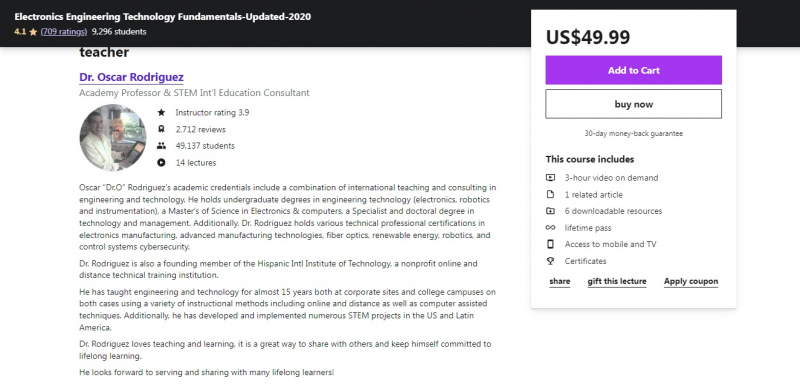
https://www.udemy.com/ -
This course begins with the fundamentals of electrical circuits and progresses to industrial and commercial systems. The course examines the various types of voltages and their sources in the actual world, with a focus on transformer formations from the power supply authority, as well as AC and DC voltages.
This Fundamentals of Electrical Controls (Udemy) course teaches students the skills and knowledge they will need to get started as a controls electrician. Students will learn about the basic components and functions of industrial control boards, as well as how to repair and maintain control systems, install motor controls, and understand how electrical control components work.
Students can use the course's four hours of on-demand video and 13 downloadable resources to deepen their education. Although no prerequisites are necessary, it is advised that students have some prior knowledge of electrical circuits in order to better understand the course materials. This course is designed for aspiring and practicing electricians who need a refresher on motor control fundamentals.
Pros: Lifetime access to course materials, Excellent student reviews, Teaches in-demand skills
Cons: Does not cover advanced electrical engineering topics
Price: $19.99
Time to complete: 4 hours
Prerequisites required: None
Flexible schedule: Yes
Includes verified certificate of participation: YesLink: https://www.udemy.com/course/fundamentals-of-electrical-controls/
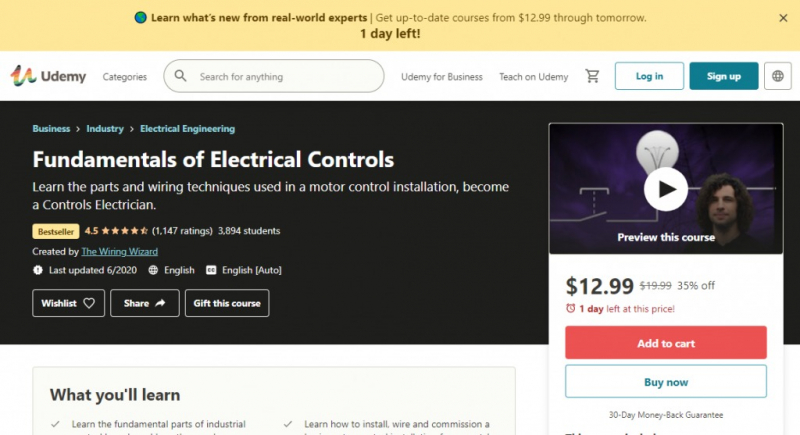
https://www.udemy.com/ -
Alison is a free online learning platform with 20 million users, 3.5 million graduates, and 3,000 different courses. In any electrical distribution system, transformers are a familiar sight. To learn about transformers and how power is delivered through an electrical system. This free online course walks you through all of the major parts of an electrical transformer (core, windings, etc.). You will learn about oil level readings and how the temperature of a transformer is measured.
This Electrical Engineering – Electrical Transformer Components course is ideal for people who wish to move away from boring lectures and video courses and instead engage in interactive learning via the use of 2D and 3D models and animations. These interactive models are used in the course to assist students to understand how each component of an electrical transformer operates. Students will learn about Buchholz relays, silica gel breathers, and tap changers, among other things. Students can acquire a digital or paper certificate for $26 or $33 to validate their newfound skills after completing the course.
Pros:Interactive learning tools, Short course length
Cons: Certificate costs extra
Price: Free
Time to complete: 1.5 to 3 hours
Prerequisites required: None
Flexible schedule: Yes
Includes verified certificate of participation: Yes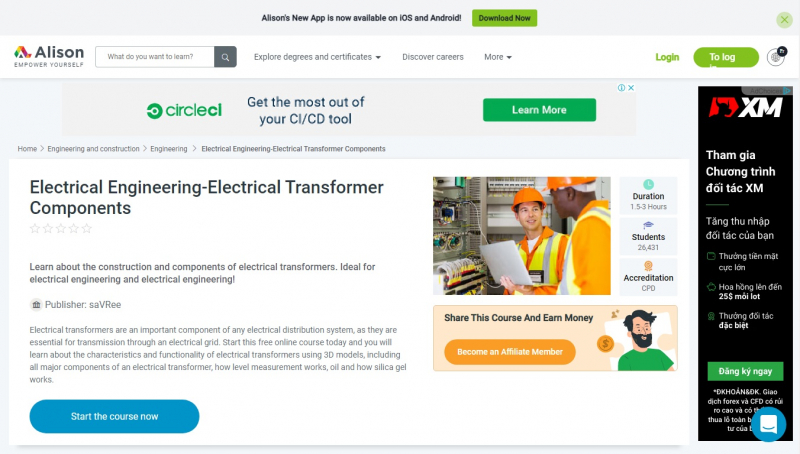
https://alison.com/ 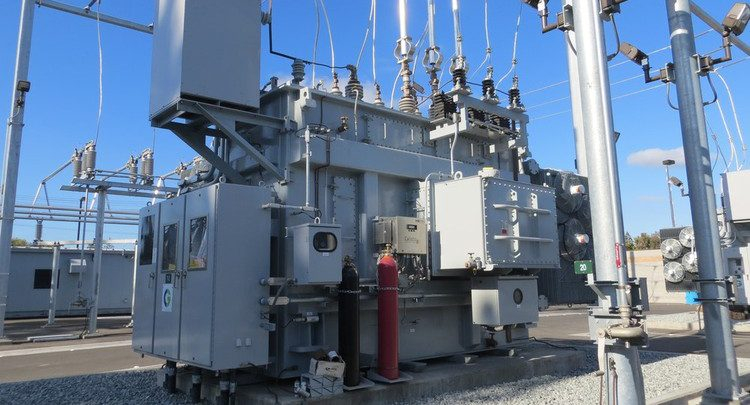
https://www.coursesforfree.net/ -
You will also know how a moving coil meter works, the functions of test equipment such as a voltmeter, ohmmeter, and multimeter, and the difference between an analog and a digital voltmeter. To ensure correct electrical installation and maintenance, you must be able to understand wire and cable connections. Professionals in the construction and electrical engineering industries, as well as learners who want to develop a working knowledge and understanding of the electrical trade, will benefit greatly from this introduction to fundamental electrical drawings and equipment instruction.
This Introduction to Basic Electrical Drawings and Test Equipment course will teach you how to read drawings and familiarize you with key words related to them, such as electrical symbols, lines, and layouts. Because an electrical plan is one of the most crucial plans in a project, it is critical that you memorize it.
Scale drawings, power plans, lighting floor plans, electrical specifications, and diagrams will be found next. The course will also address the various electric current test devices, such as an ammeter and a galvanometer, as well as their applications.
Pros: Teach in-demand skills, Accredited by CPD UK
Cons: Curriculum does not include advanced topics
Price: Free
Time to complete: 1.5 to 3 hours
Prerequisites required: None
Flexible schedule: Yes
Includes verified certificate of participation: YesLink: alison.com/fr/cours/introduction-aux-dessins-electriques-de-base-et-a-l-equipement-d-essai-revise
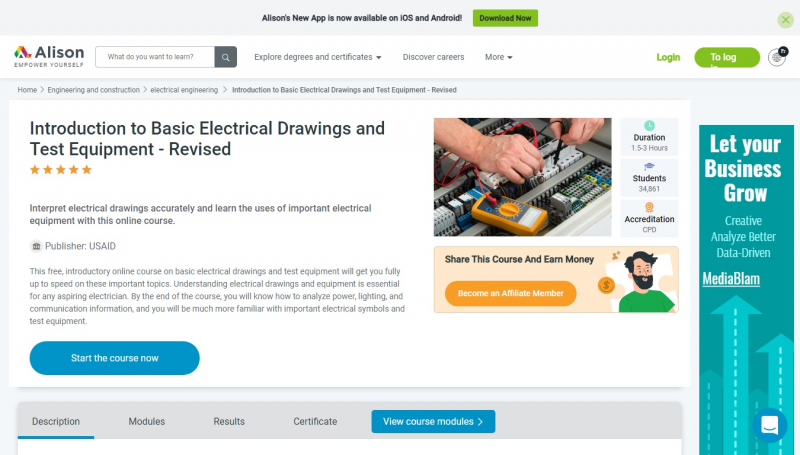
https://alison.com/ -
This course is for you if you want to learn how to understand electrical circuits and the fundamental ideas of electrical engineering. This Electric Circuits – Basics of Electrical Engineering course is ideal for students who are new to electrical engineering because it covers a wide range of fundamental subjects.
The electrical circuit is the essential building block of all electrical and electronic systems, and you must have a firm grasp on these ideas in order to develop in anything electrical in nature. This course is the greatest method to dive headfirst into this course. Essential concepts such as Ohm's Law, circuit analysis, power calculations, and voltage laws are covered in this course. Hands-on class projects allow participants the opportunity to apply their knowledge and cooperate with other students as part of the program. After finishing the course, you will have access to all other Skillshare courses, making it simple to continue your education.Pros: Comprehensive, beginner-friendly curriculum, Access to all other courses on Skillshare’s library
Cons: No certificate of completion
Price: $99 per year; $19 per month
Time to complete: 4 hours
Prerequisites required: None
Flexible schedule: Yes
Includes verified certificate of participation: NoLink: skillshare.com/classes/Electric-Circuits-Basics-of-Electrical-Engineering/674332600?
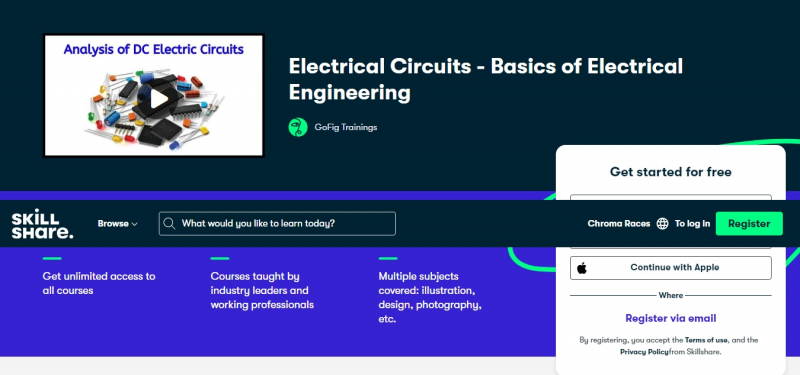
https://www.skillshare.com/ 
https://www.electricalclassroom.com/











